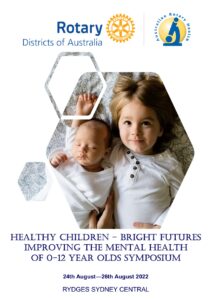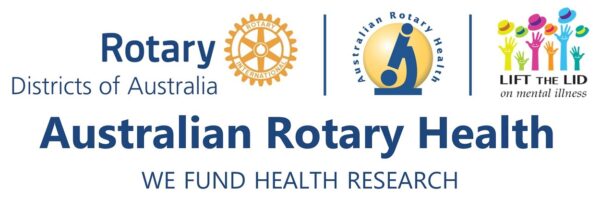ARH Change Mental Health Research Focus
National health symposiums have been hosted by Australian Rotary Health over the years. Previous symposiums have focused on cot death, muscular dystrophy, health of the ageing, adolescent health, family health and mental health.
PREVIOUS SYMPOSIA
1986 – Cot Death
1986 – Muscular Dystrophy
1988 – Alzheimer’s Disease
1990 – Environment, Health and the Elderly
1992 – Adolescent Health Behaviour – Identifying Vulnerability and Resilience
1996 – Health and the Family
1999 – Mental Illness
2003 – Mental Illness – Bringing together Consumers, Carers, Clinicians and Researchers
2006 – Improving Mental Health Services in Australia
2013 – Prevention of Mental Health Disorders across the Lifespan

In 1998, the Board of ARH accepted a recommendation from its Research Committee that funding focus on mental health. Since that time, ARH has provided $20 million to support this area of research.
Rotary Clubs in all Australian States and Territories support ARH, which is now one of the largest non-government funders of mental health research within Australia. Funding is used to support research grants, postdoctoral fellowships, and PhD scholarships.
2022 SYMPOSIUM
The most recent symposium was held in Sydney in August 2022 titled ‘Healthy Children, Bright Futures: Improving the Mental Health of 0-12 Year Olds’. The Symposium launched the new research focus, bringing together more than twenty of Australia’s leading mental health experts to weigh in on some of the issues relating to children’s mental health.
One of the aims of the event was to seek advice about the areas of research where ARH funding can most effectively be employed to improve the mental health of Australian children.
SYMPOSIUM GOALS
- To launch the new ARH program that will support research designed to improve the mental health of Australian children (0-12 years).
- To seek advice about the areas of research where ARH funding can most effectively be employed to improve the mental health of Australian children.
- To provide a forum in which Australian researchers can describe current innovative research activities relative to the new ARH program.
- To generate material (e.g., videos of researcher presentations) that can publicise the new ARH program to potential donors including Rotarians, commercial organisations, and individuals in the general community.
KEY RECOMMENDATIONS
Key recommendations identified from the survey of researchers at the end of the Symposium were for more:
- Studies in which interventions can be readily translated into practice because they are being tested in the settings where they are to be delivered (e.g., schools, private practices, health centres, etc).
- Studies in which service providers and consumers are included in the design and testing of a new intervention.
- Studies focusing on priority populations (including Indigenous people)
- Providing support for younger researchers (e.g. Early Career Researchers).
CELEBRATING OVER 40 YEARS OF SUPPORT BY ROTARY DISTRICTS OF AUSTRALIA
